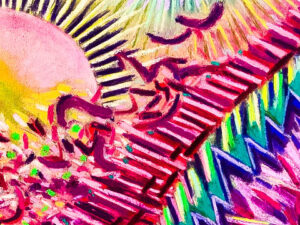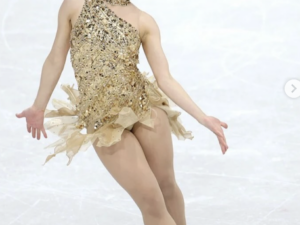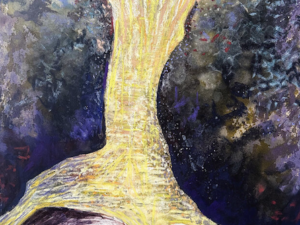Paradise in Plain Sight is written by a female Zen priest about the metaphors for life that she’s gleaned from her Japanese garden. I had also, years ago, read and enjoyed her book Hand Wash Cold (my 2012 blog review is here), which is why this book was on my radar. While not a Zen Buddhist myself, she has universally interesting things to say, and I’m a strong believer in interfaith understanding.
This is a gentle, meandering read. She muses on topics like the path, the moon, ponds, roots, fruit, flowers, leaves, and weeds, which are the titles of her chapters. I particularly liked her reflections on time (that it is not what we think) and the chapter on leaves, where she realized that in sixteen years of cleaning up after three sycamore trees, she had literally dealt with multiple tons of leaves, but the only way she managed that without being overwhelmed was one day at a time.
Here is the dedication:
Dewdrops on a blade of grass,
Having so little time
Before the sun rises;
Let not the autumn wind
Blow so quickly on the field.
by Dojen Zenji
Here are some bits from the book I flagged to share with you:
- “No matter what your story is, whatever your creed, you come to spiritual practice looking for paradise.”
- “Zen meditation points directly to the truth of the human mind, which does not, by the way, mean the space inside your head. It means the universe beneath your feet.”
- “Is it even possible to live in a world without fear? I wish more people would ask. Anxiety disorders are the number one diagnosis of the mental health industry. Each year, about 40 million American adults seek treatment for debilitating fear and dread. Now children are swelling there ranks. In one recent year, 85 million prescriptions were filled for the leading anti-anxiety drugs. Antidepressant use has quadrupled over the last 20 years. About 1 in 10 people suffer from chronic sleeplessness. Deaths from prescription painkillers are epidemic and higher than those of illegal narcotics. There are 140 million people in the world with alcoholism… (these numbers are low and are from 2014). We live stupefied by our own terror, our unmet fears. Every time we turn away from what is right in front of us we are headed in the wrong direction. So don’t turn away.
- “Someday must be the great lie of our lifetimes. We tell it for forty or fifty years. After that we trade its false promise for the dead sentiment of the good old days. Both are thieves that will steal time right out from under your nose,, and you will grieve your passing life as if robbed.”
- “Where else could eternity be but right here right now?”
- “In performing atonement, we acknowledge the suffering caused by our own ignorant view of ourselves as separate from the world we inhabit. Our ignorance of truth gives rise to greed and anger.”
- “We forgive because we can. And we forget because we must, or condemn ourselves to a life of pain. So forget the story you tell yourself about your parents, the story you tell yourself about your childhood, the story of absence and lack. Forget the birth story, the death story, the divorce story, the story you keep repeating, the story you’ll never forget. Forget that story and do not replace it with another. Forget what might have been and what might yet be. The past is gone and the future will arrive on schedule. Forget what you thought. Forget what you felt. Today is the tonic for yesterday. Now is the only cure for then. Forget, and you will know genuine gratitude. Gratitude is the fruit of letting go.”
- “Don’t deceive yourself. We’re all taught to refrain from lying, and we usually interpret this to mean lying to others. In truth, every time we tell a lie, we lie to ourselves, and we are the only ones consistently fooled. We can seldom con others as long as we con ourselves. My greatest deceit is the deceit of a separate self, with all my ego-reinforcing views. Don’t make excuses for yourself… The responsibility for my life begins right here, and only when I stop excusing myself does my life benefit everyone and everything…. To take complete responsibility for yourself is to no longer tell yourself lies or make excuses as if you were a powerless victim of your own life. Taking responsibility for yourself means taking responsibility for everything.”
- “Flowers are love’s perfect offering. They do not ask to be appreciated. They expect nothing in return. They just let go… Like blossoms in their evanescent beauty, throw yourself into this moment and leave no trace.”
- “Buddha’s Four Noble Truths: 1). Life is suffering (Things change.) 2). The origin of suffering is attachment. (It hurts when things change.) 3). The cessation of suffering is attainable (Accept that things change.) 4). There is a way out of suffering (By changing yourself.)
- “It is rare to be seen and that seeing without judgement is an act of love.”
- “Whatever appears in front of you is your liberation– that is until you judge it. Then you imprison yourself again.”
- “Do we grieve most for what we’ve lost or for what we never had?”
- “Whatever you practice, you’ll get very good at. Just replace harmful practice with one that does no harm.”
It is the poet in me that liked this book. If you are inclined the same way, you may like it too. I give it four stars.
2 Comments
Pingbacks
-
[…] 2. Paradise in Plain Sight: Lessons from a Zen Gardener (my review) […]
-
[…] 2. Paradise in Plain Sight: Lessons from a Zen Gardener (4 star review here) […]








